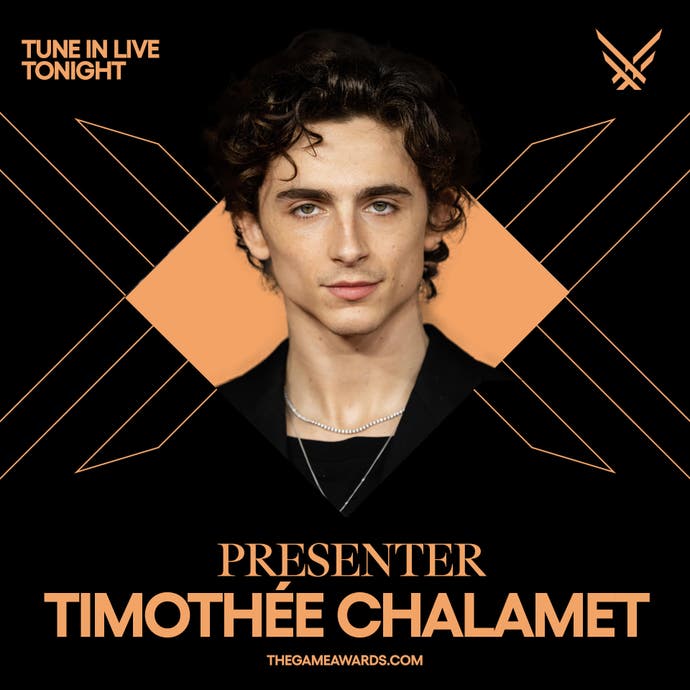The Game Awards will never represent our industry in the way it needs, so what next?
"Please wrap it up."
Since their establishment in 2014, The Game Awards have never been wholly welcomed by the wider world of video games, but this year the response has felt if not different, then at least more prominent. There is an undeniable sense, waking up after last night's ceremony-cum-advertisement reel, that developers in particular are deeply frustrated.
Naturally, there are caveats. In 2023 the industry still regularly debates itself about all manner of things, from whether community managers and in-house PRs count as game devs to, as Dave the Diver reminded us, what exactly counts as an indie game. I'd expect no more unanimity on the topic of The Game Awards as I would any of those. But there is definitely a prominent, loud, and absolutely unignorable chorus of discontent, and it is definitely louder and even less ignorable this year than before.
Arguably the most prominent call has come from The Game Awards' own Future Class, a kind of inclusion-minded 30 Under 30 award nominated each year by industry peers, with the group described as the "inspiring individuals who represent the bright, bold, and inclusive future of video games". A couple of weeks before this year's event, more than half of the entire Future Class group - 79 of the 150 members, before the 2023 class were added - joined almost 3000 additional developers in signing an open letter to the awards organisers.
Addressed to awards founder, host, and general TGA face Geoff Keighley, Future Class director Emily Bouchoc, and the "whole The Game Awards team", the Future Class requested a platform for a statement on the Gaza crisis, partially in response to Thirsty Suitors writer Meghna Jayanth stepping down from her role as a presenter, when she was blocked from making a "political statement" at another awards show weeks before.
"You didn't choose us as symbols of what the game industry currently is, but of what it could be: a diverse, inclusive and caring workplace," they wrote. "A positive force in the world that can influence billions of people. We want to sincerely thank you for the trust you extended when nominating us.
"Like many of our peers, we are appalled by the war crimes the Palestinian people are victims of, and we grieve the loss of so many civilian lives. Adding to that pain, is the knowledge that our industry is playing a role in this... Yet, when Meghna Jayanth wanted to address that in her speech at the Golden Joysticks Awards this year, she was urged to keep silent. With the current state of the game industry, silence is a message. Silence is tacit support. Silence is dehumanisation of Palestinian lives."
You can also trace the discontent a little further back, to this year's Summer Games Fest, also presented and organised by Geoff Keighley, where he faced significant criticism for failing to feature a single woman on stage. Keighley responded to note this as "a fair flag", and that a woman was originally due to appear at some point, during the two-hour show. (A quick disclosure here: Eurogamer is currently owned by ReedPop, originally the organiser for this year's E3, which previously filled SGF's June announcement slot.)
Back to The Game Awards, and more discontent: outside the show, a small crowd of protestors gathered to highlight the ongoing push from SAG-AFTRA unionised game workers currently seeking better contract negotiations, and also generally promote unionisation and criticise the unprecedented wave of layoffs that have hit the industry this year. Inside, meanwhile, leading developers like legendary Zelda director Eiji Aonuma, or Baldur's Gate 3 director Swen Vincke, were shooed off stage by "WRAP IT UP" signs after mere 30-second speeches - in Vincke's case, just as he was taking a moment to honour a fellow Larian developer, Baldur's Gate 3 cinematic lead Jim Southworth, who passed away just last month.
The result has been nothing short of fury. Jayanth retweeted an article from Paste today which called The Game Awards "a fraud... it's very easy to ignore them, and everybody should do so from here on out." Clay Murphey, principal writer at Control and Alan Wake 2 developer Remedy, called the awards "a joke," for skipping over the recognition of developers' years of work "just to play 10 minutes of bland ads... If this is going to be our industry's big award show then we should demand better."
JC Lau, a Future Class member and multi-award winning developer at new triple-A studio Probably Monsters, wrote that the awards "gotta make that advertising money somehow," alongside a copy of the rules around 30-second speeches (Aftermath noted that a whopping 13.5 acceptance speeches could've been given in the time long-term friend of Geoff Keighley, Hideo Kojima, spoke on stage without a limit). Meanwhile, Josh Sawyer, director of Pentiment and studio design director at Obsidian, called The Game Awards "an embarrassing indictment of a segment of the industry desperate for validation via star power with little respect for the devs it's supposedly honouring." The Last Worker and C-Smash VRS's outspoken director Jörg Tittel responded: "Fucked up."
None of this is to say that it isn't a positive, in its own way, for developers to receive some recognition - however brief - on a big stage in front of what is now the largest annual gathering of their peers. Nor that the people attending haven't had a good time - there are enough photos doing the rounds of Larian devs in bear costumes, and equally upbeat posts with delighted winners at the afterparty, to know that there'll be plenty of well-earned hangovers and rightfully delighted teams waking up next to their trophies. This industry is notorious for the toll it takes on its workers, and for the rarity of occasions that get a load of them together in one room.
Nevertheless, The Game Awards are not what many video game developers want, which as they've made clear over the past few weeks is a platform, an occasion for shared appreciation, and above all representation of game developers as they truly are - often, as we've discovered: dedicated, overworked, political and at times radical artists and engineers. Inspiring individuals who represent the bright, bold, and inclusive future. But there's also, crucially, little reason to believe The Game Awards will change.
At both The Game Awards and Summer Games fest, for instance, publishers pay substantial amounts of money to have their trailers shown as part of the many advertising breaks, "world premieres" and sizzle reels. That means that the organisations funding the event itself might also be the same organisations who get skittish around, say, political statements on international conflicts. Or about how awful it is that developers aren't unionised, or that in 2023 alone, someone has laid almost 10,000 of them off.
It also means that the event, if it's to continue making the kind of money it does, must continue to get large numbers of eyeballs on it every year. Which is why, you'd assume, Dune and Wonka movie superstar and Gen Z heartthrob Timothée Chalamet was the person chosen to present the ultimate Game of the Year award this year, as opposed to, say, one of Swen Vincke's own industry peers. And all that feeds back into the same problem so succinctly summarised by Josh Sawyer: The Game Awards perfectly encapsulate the sense that some parts of this industry remain desperate for legitimacy and validation from the wider world.

This is the same problem frequently brought up in ironic tones amongst journalists when an article appears in a mainstream publication - or a trade body representative goes on the evening news - and delivers the classic, "Did you know, video games are big business?" opener, and something to do with them being worth more to the economy than film and music combined. It's also the same problem that holds some games and, occasionally, developers back themselves. The notion that video games continue to be sneered at - admittedly, very true at times - from those outside of the gaming world, and the conclusion that they'll never truly be taken seriously until those people are won round. The mistake, of course, is thinking that those people can ever be won round. Or that the opinions of those people matter.
On the awards front, I'd wager the alternative must be something entirely constructed by developers. And there are examples out there already, with their own issues and caveats of course, like the DICE awards, or IGF and Game Developers Choice awards at GDC. Even then, there's a reason why the Oscars have an existential crisis every year, with perpetual concern over how they're hosted, how much time goes to the winners (45 seconds per speech to TGAs' 30, by the way), and whether some awards even get televised at all. It wouldn't be unreasonable to suggest there'll always be problems with any kind of awards.
Still, here the problem remains the continued urge for relevance, which much like the desire of a slightly awkward teenager to be considered cool, is in a way the cause of the problem itself. The more you try to seem cool, I seem to remember being told, the less cool you look. In The Game Awards' case, the more you try to make people take you seriously, the less serious you come across. The solution is for an awards ceremony that, instead of searching for outside approval, instead mirrors that wider goal that the industry's best developers have always had, like the developers at Larian, or Remedy, or Nintendo: to make something that's brilliant for its own reasons. Keep doing that, and the rest of the world will start to care on its own.
-3-31-23-screenshot.png?width=690&quality=75&format=jpg&auto=webp)








